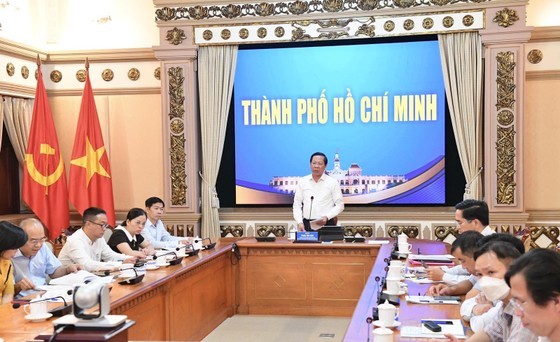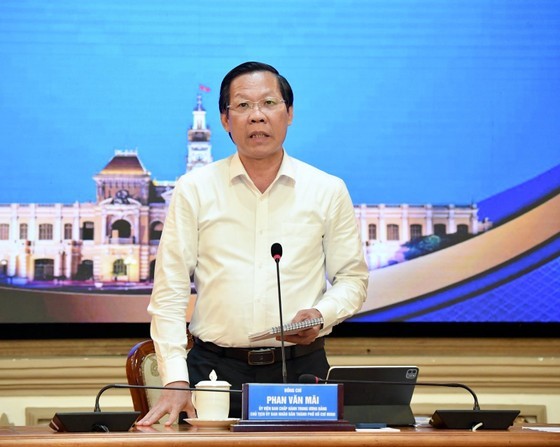 Chairman of the HCMC People’s Committee Phan Van Mai and representatives of the departments of the city attend the dialogue in HCMC's location.
Chairman of the HCMC People’s Committee Phan Van Mai and representatives of the departments of the city attend the dialogue in HCMC's location.
The event chaired by Prime Minister Pham Minh Chinh saw the presence of Minister of Planning and Investment, Nguyen Chi Dung; Chairman of the Government Office, Tran Van Son; Minister of Justice, Le Thanh Long; Minister of Industry and Trade, Nguyen Hong Dien; Minister of Culture, Sports and Tourism, Nguyen Van Hung; the Acting Minister of Health, Dao Hong Lan.
There was also the Republic of Korea (RoK)’s Ambassador Park Noh-wan, representatives of the Korean Chamber of Commerce and Industry (KORCHAM) in HCMC and Korea Trade-Investment Promotion Agency (KOTRA).
Chairman of the People’s Committee of HCMC Phan Van Mai highly appreciated the economic contributions and urban development initiatives of the Korean investors and businesses.
The city will continue to give instructions for investors to implement procedures of investment, land and construction in order to early kick off projects.
 Chairman of the HCMC People’s Committee Phan Van Mai speaks at the meeting.
Chairman of the HCMC People’s Committee Phan Van Mai speaks at the meeting.
Regarding to seaport infrastructure fees for use of infrastructure facilities and public services at seaport terminals for import-export activities in the city, he said that the People’s Council of HCMC approved Resolution No. 10/2020/NQ-HDND dated December 9, 2020, on collecting infrastructure fees at seaports in October 2020. From April 1, HCMC officially collected seaport fees that were postponed for several times due to the Covid-19 pandemic.
Organizations and businesses at home and abroad proposed a reduction of seaport infrastructure fees to relieve the burden on enterprises affected by the Covid-19 pandemic and reduce import and export costs for businesses. At a meeting of the municipal People's Council in July, port infrastructure fees for international goods transported by inland waterways in and out of HCMC were cut by half from August 1.
HCMC's seaport connection infrastructure has been invested but it is not commensurate with the potential and practical demand. Therefore, the southern economic hub will continue to synchronously invest in seaport infrastructure to reduce business costs.
Currently, many Korean leading groups and businesses have effectively invested and operated as well as made contributions to the socioeconomic development of Vietnam in general and HCMC particularly.
Korea is the largest foreign direct investment partner of Vietnam with 9,383 projects worth over US$79.8 billion in 19 of the 21 economic sectors and 59 of the 63 localities nationwide.
























